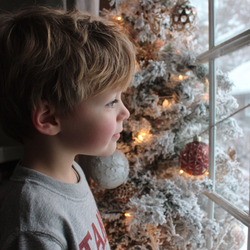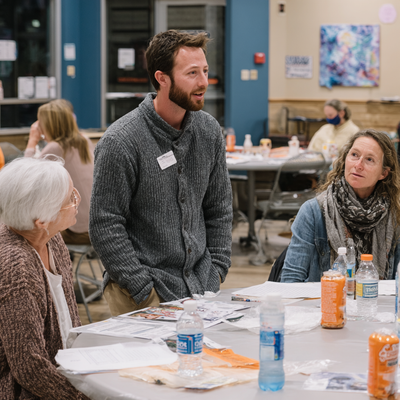Sarah's been weird lately. Not like dramatic weird. Just... off.
Used to text me back immediately when I asked nursery questions. Now takes her hours to respond, if she responds at all. Used to hang around after service chatting about how things went. Now she's gone before I can catch her.
Been trying to pin her down for weeks to talk about some nursery stuff. She's always rushing out to get somewhere or suddenly remembering something she forgot in her car.
Finally caught her in the parking lot yesterday. Literally stood next to her minivan so she couldn't escape.
"Hey, you okay? Feel like you're avoiding me."
That's when she completely lost it. Just started sobbing right there between the cars.
"I can't do this anymore," she said. "But I don't know how to stop."
Turns out Sarah wasn't avoiding me. She was drowning and I'd been too oblivious to notice.
Warning Signs I Totally Missed
Looking back, it's embarrassing how obvious it was.
Sarah stopped volunteering for extra stuff. Used to be first person to say yes when we needed help with events or special projects. Past few months? Nothing.
Started showing up exactly when her shift started instead of thirty minutes early like she used to. Left immediately when it ended instead of sticking around.
Stopped making suggestions about room setup or supply organization. Sarah always had opinions about how to make things work better. Lately she just did whatever I asked without saying anything.
Should've been giant red flags. But I was so focused on keeping everything running that I missed my best volunteer falling apart.
My "Helpful" Solution That Backfired
When I finally noticed Sarah seemed stressed, thought I'd be supportive and get her some help.
"Let me find you an assistant. Someone to share the workload."
Seemed like perfect solution. Except Sarah heard it as "You're not doing a good enough job on your own."
Made her feel like she was failing instead of being supported.
Plus now she had to train someone new and manage them on top of everything else she was already doing.
Basically doubled her stress while trying to help.
The Guilt Speech That Made Everything Worse
Couple months ago during volunteer appreciation, gave this heartfelt speech about our long-term servants.
"Sarah's been faithfully serving in nursery for four years. Rain or shine, sick kids, holiday weekends, she's here taking care of our babies. Honestly don't know what we'd do without her."
Meant it as appreciation. Sarah heard it as "You can never leave or everything will fall apart."
Created pressure that made it impossible for her to take breaks or ask for help without feeling like she was abandoning everyone.
The Job That Kept Growing
Started looking at what Sarah actually does every week. Turns out "nursery coordinator" had somehow become about six different jobs.
Volunteer scheduling. Supply management. Parent communication. Safety coordinator. Crisis response. Plus actually working with babies.
Nobody asked her to take on all this stuff. Just happened gradually because Sarah's competent and willing to help.
By the time I paid attention, she was basically running an entire department by herself while I assumed someone else was helping.
Missing the Real Problem
Thought burnout meant being too busy. Didn't realize it's about emotional exhaustion more than time management.
Sarah wasn't just changing diapers and reading stories. She was managing anxious parents, dealing with difficult behaviors, making constant decisions about kids' safety and wellbeing.
Carrying responsibility for every child being happy and every parent being satisfied.
That's draining in ways that have nothing to do with how many hours you work.
The Break She Couldn't Take
Suggested Sarah take a Sunday off when she mentioned feeling tired.
"I can't. Who would handle everything?"
She was right. We didn't have backup systems for any of the stuff she'd taken on.
Taking time off meant either leaving huge gaps or dumping her responsibilities on people who had no idea how to handle them.
So she kept showing up because the alternative felt worse than being exhausted.
What Actually Worked
Stopped trying to fix Sarah and started asking what she actually needed.
"What would make this sustainable for you?"
Not "How can we help you do everything better?" Just "What would actually work for your life?"
Got real answers about what was draining her energy versus what parts of the job she actually enjoyed.
Breaking Up the Monster Job
Realized Sarah's role was actually five different positions that could be handled by separate people.
Someone who likes organizing could do volunteer scheduling. Person who enjoys shopping could handle supply management. Someone with people skills could manage parent communication. Multiple people could rotate crisis response duties.
Sarah kept the parts she loved - actually working with babies - and handed off everything else to people who were better suited for those tasks.
Building Real Backup
Trained multiple people to handle each piece of nursery operations instead of having everything depend on Sarah's knowledge.
Wrote down procedures so coverage didn't require one person knowing everything.
Created schedules that built in breaks instead of expecting people to ask for time off.
Made it possible for Sarah to miss without everything collapsing.
The Talk That Fixed Things
Asked Sarah what she wanted her role to look like going forward.
"I love babies. I hate managing people and dealing with complaints."
Restructured everything around what gave her energy instead of what drained it.
She stayed in nursery but passed administrative stuff to people who actually enjoyed that type of work.
What Burnout Actually Looks Like
It's not usually about being too busy. It's about feeling trapped doing things that suck your soul dry.
People burn out when they feel responsible for more than any human should reasonably handle.
Appreciation speeches don't fix burnout if the underlying problems stay the same.
Most volunteers won't ask for help because they don't want to seem ungrateful or weak.
Warning signs are subtle and easy to miss when you're focused on programs instead of people.
Signs I Should've Noticed
Less enthusiasm for stuff they used to love Showing up on time instead of early Leaving immediately instead of hanging around Stopped volunteering for extras Less communication, fewer ideas Going through motions without real engagement
What Actually Prevents Burnout
Regular conversations about how people are doing, not just what needs doing Clear limits on what each role includes Built-in breaks that don't require asking permission Multiple people trained for every essential job Permission to say no without feeling guilty Designing roles around what energizes people
Resources That Get It
Orange focuses on volunteer sustainability, not just appreciation. Kids Sunday School Place addresses burnout prevention in their volunteer guides. Group's DIG IN talks about emotional exhaustion, not just time management. Grow Curriculum builds flexibility for when people need breaks. Gospel Project connects service to spiritual health instead of obligation.
But honestly, best burnout prevention is paying attention to your people and responding when they're struggling.
What I'm Doing Now
Asking different questions: "What's draining you?" instead of "What do you need help with?" Watching for changes in energy and engagement Building backup systems before people burn out Regular check-ins about role satisfaction Making it okay to step back without guilt
Sarah's great now. Still loves nursery but isn't carrying the weight of everything by herself.
Almost lost my best volunteer because I was more worried about programs than people.
Won't make that mistake again.








